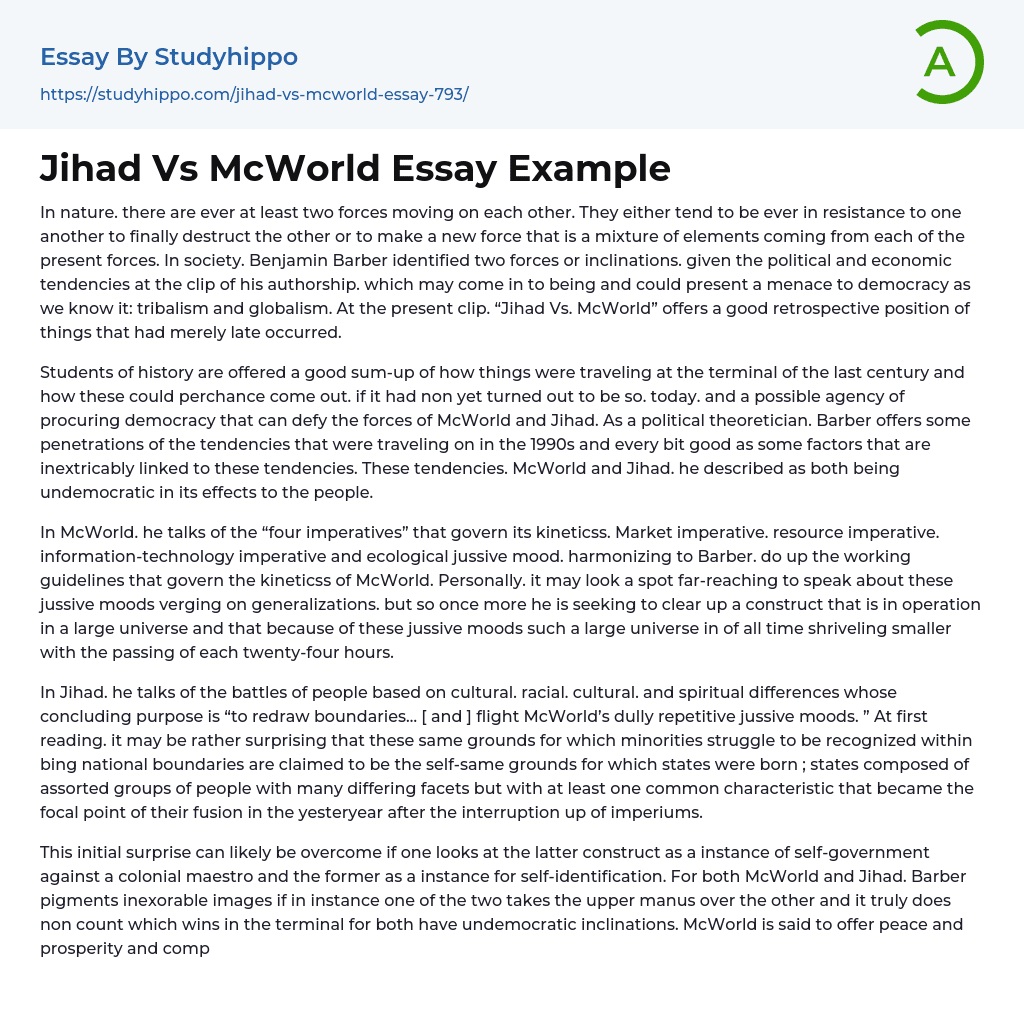In nature, two opposing forces constantly collide, either resulting in one prevailing over the other or creating a new force that is a blend of both. Similarly, in society, Benjamin Barber identified two opposing forces - tribalism and globalism - which pose a threat to democracy. The book “Jihad Vs.McWorld” by Barber provides a retrospective view of the political and economic tendencies of his time and offers a possible solution to protect democracy from the forces of McWorld and Jihad. As a political theorist, Barber explains how the undemocratic effects of McWorld and Jihad arise from four imperatives - market, resource, information-technology, and ecological - which govern their dynamics. Overall, Barber provides valuable insights into the tendencies and factors that shape modern society.Discussing jussive moods and generalizations may seem far-reaching, but the author is attempting to clarify a co
...ncept that impacts a vast universe. These jussive moods are causing the universe to shrink with each passing day. In his book Jihad, the author discusses cultural, racial, and spiritual differences that lead to battles aimed at redrawing boundaries and avoiding the predictable jussive moods of McWorld. While the grounds for minority struggles for recognition within national boundaries may appear similar to those for states' formation, the crucial difference is that the former is a case of self-identification, and the latter is an example of self-government against colonial masters. Barber depicts both McWorld and Jihad as having undemocratic inclinations, irrespective of who wins in the end.According to Barber, McWorld promises peace, prosperity, and relative honesty while Jihad fosters community, affinity, and solidarity. These offerings are mutually exclusive, as one cannot have both McWorld and Jihad at th
same time. McWorld relies on interdependence while Jihad thrives on exclusivity. However, Barber proposes a solution where the economic benefits of McWorld can be enjoyed without sacrificing the exclusionary ideals of Jihad. This solution is a confederal government that embodies decentralized participatory democracy with elements of parochialism, communitarianism, and participatory administration. Barber argues that democracy should grow from the bottom up, starting with the people. For me, as people form countries, it is essential that principles of self-government and governance are well-defined and understood to prevent or minimize the excesses of McWorld and Jihad. Barber's discussions on the contrast between Jihad and McWorld paint a somber picture that may seem far-fetched but is nonetheless reflective of contemporary trends that could ultimately dissipate.The essay's value is in its timeliness; the discussed events were recent and possibly witnessed firsthand by readers. The claims can be verified by other sources and personal memories, particularly for those born during or shortly before the collapse of the Soviet Union or Quebecois unrest. Barber proposes a solution that is not extreme, but a mild adjustment to the current system for the wealthy. Students of history will benefit from Barber's work as he presents a moderate solution that combines the best of McWorld and Jihad. He allows readers to choose if they want to follow his proposal or develop a better one, which aligns with his belief in democracy. The middle-ground solution may take time, but moderation is the key to success; rushing it will only lead to failure. Like the tortoise, slow and steady wins the race.
- Organic Chemistry essays
- Acid essays
- Calcium essays
- Chemical Bond essays
- Chemical Reaction essays
- Chromatography essays
- Ethanol essays
- Hydrogen essays
- Periodic Table essays
- Titration essays
- Chemical reactions essays
- Osmosis essays
- Carbohydrate essays
- Carbon essays
- Ph essays
- Diffusion essays
- Copper essays
- Salt essays
- Concentration essays
- Sodium essays
- Distillation essays
- Amylase essays
- Magnesium essays
- Acid Rain essays
- Business Law essays
- Contract essays
- Consumer Protection essays
- Property essays
- Ownership essays
- Agreement essays
- Common Law essays
- Contract Law essays
- Justice essays
- Security essays
- Tort Law essays
- United States Constitution essays
- Crime essays
- Lawsuit essays
- Treaty essays
- Family Law essays
- Marijuana Legalization essays
- Constitution essays
- War on Drugs essays
- Court essays
- Jury essays
- Police essays
- Protection essays
- Community Policing essays
- Criminal Law essays
- Judge essays




